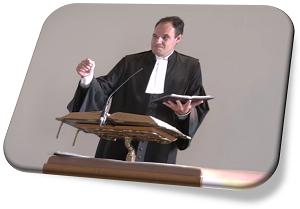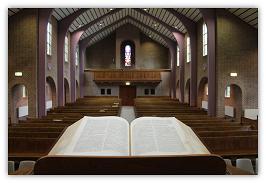Spirit-Anointed Preaching and its Role in Revivals
Spirit-Anointed Preaching and its Role in Revivals
Much has been written in recent years on the subject of revivals, and a great deal of attention has been given to the extraordinary conversions that took place during those mighty movements of the Holy Spirit in the past. What also needs to be emphasized, however, is the key role that preaching has played in producing these conversions. While the new birth in all its manifestations must ultimately be traced to the Holy Spirit, it should be remembered that He generally works through the means, in this case the means of preaching by men especially endowed for that purpose. It was Spirit anointed preaching that led to such great ingathering of souls as the Great Awakening and similar events.
All true preaching is Spirit anointed, but when it comes to revivals we have to say that the preaching which led to these extraordinary phenomena was characterised by extraordinary outpourings of the Spirit, both on preachers and their audiences. Could we have been present at one of those services where Edwards preached or Whitefield, we would have known immediately the difference between the preaching we hear in our churches and the messages these men delivered. In some cases the difference may be one of content as well as delivery, but even where the content is basically the same, that is, thoroughly Biblical and Reformed, there would still be a noticeable difference. This difference can be summed up in one word: power.
 Dr. Lloyd-Jones, in his book Preaching and Preachers, says that this power can come upon a preacher suddenly and it can also be withdrawn instantly. He mentions the case of a Welsh preacher, David Morgan who, after he had heard another minister preach with exceptional power, went to bed profoundly affected by this. He had been a faithful preacher for years but nothing much had happened as a result of his ministry. As he said later, "that night I went to bed just David Morgan as usual. I woke up the next morning feeling like a lion, feeling that I was filled with the power of the Holy Ghost." He began to preach with such power that people were convicted and converted in large numbers. This went on for two years and then suddenly it stopped. "I went to bed one night," he says, ''still feeling like a lion, filled with this strange power that I had enjoyed for two years. I woke up the next morning and found that I had become David Morgan once more." He lived for another fifteen years, exercising a most ordinary ministry. Lloyd-Jones comments: The power came and the power was withdrawn. Such is the Lordship of the Spirit! You cannot command this blessing, you cannot order it; it is entirely the gift of God … Revivals are not meant to be permanent, but I maintain that all of us who are preachers should be seeking this power every time we preach" (pp.322-324).
Dr. Lloyd-Jones, in his book Preaching and Preachers, says that this power can come upon a preacher suddenly and it can also be withdrawn instantly. He mentions the case of a Welsh preacher, David Morgan who, after he had heard another minister preach with exceptional power, went to bed profoundly affected by this. He had been a faithful preacher for years but nothing much had happened as a result of his ministry. As he said later, "that night I went to bed just David Morgan as usual. I woke up the next morning feeling like a lion, feeling that I was filled with the power of the Holy Ghost." He began to preach with such power that people were convicted and converted in large numbers. This went on for two years and then suddenly it stopped. "I went to bed one night," he says, ''still feeling like a lion, filled with this strange power that I had enjoyed for two years. I woke up the next morning and found that I had become David Morgan once more." He lived for another fifteen years, exercising a most ordinary ministry. Lloyd-Jones comments: The power came and the power was withdrawn. Such is the Lordship of the Spirit! You cannot command this blessing, you cannot order it; it is entirely the gift of God … Revivals are not meant to be permanent, but I maintain that all of us who are preachers should be seeking this power every time we preach" (pp.322-324).
How does a preacher know he has this power? He will experience something similar to what the apostle Paul says in 1 Thessalonians 1:5: "Our gospel came not unto you in word only but also in power and the Holy Ghost and much assurance." Paul knew what was happening to him and so will everyone who experiences this. The apostle had much assurance. He knew he was clothed with power and authority. Lloyd-Jones, speaking from personal experience says that a person who has this power is given "clarity of thought, clarity of speech, ease of utterance, a great sense of authority and confidence, … an awareness of power not your own thrilling through the whole of your being, and an incredible sense of joy" (Ibid.). As for the people, Lloyd-Jones says,
they sense it at once; they can tell the difference immediately. They are gripped, they become serious, they are convicted, they are moved, they are humbled. Some are convicted of sin, others are lifted up to the heavens, they know at once that something unusual and exceptional is happening. As a result they begin to delight in the things of God and they want more and more teaching. They are like the people in the Book of Acts, they want to continue steadfastly in the apostles' doctrine and fellowship and breaking of bread and in prayers Ibid., p.324,325.
I have quoted the late Dr. Lloyd-Jones at some length because he was a solid and sober Bible scholar and student of church history. He had known preachers in his native Wales who had firsthand experience of revivals such as the one in 1905 and who themselves had been used by the Lord in powerful ways. Above all, he himself had on occasion preached with unusual power and unction, so he knew whereof he spoke.
Today few, if any, of us have any personal experience of the kind of revivals Lloyd-Jones refers to in his book. We may have attended so-called revival services, organized by local churches, featuring special speakers. Or we may have dropped in at places like the Toronto Vineyard Church where people bark and laugh and do all sorts of weird things. These "revivals" should not be confused with the mighty acts of God that took place during the Great Awakening in the eighteenth century and similar revivals in the nineteenth and even the twentieth century.
 True, these movements were not free from excesses either, but they were still essentially different from what today passes for revivals. The difference, I believe, has to do with at least three things: 1) the preparation for revival; 2) the characteristics of revival; and 3) the preaching during a revival.
True, these movements were not free from excesses either, but they were still essentially different from what today passes for revivals. The difference, I believe, has to do with at least three things: 1) the preparation for revival; 2) the characteristics of revival; and 3) the preaching during a revival.
As for the first point, modern revivals are planned events. Weeks and months in advance, meetings are held to organize and arrange these services, speakers have to be booked, choirs need to practice, ads have to be written and placed in newspapers, etc. Not so with the revivals of the past. There was a kind of preparation, but only in the sense that earnest prayer was made for the Lord to come down with power. When God answered these prayers, the revival still came suddenly and often unexpectedly as far as the exact time was concerned. It was clear to all that when revival came it was God's work and His alone. The sovereignty of the Spirit was recognized and the prevailing mood was one of reverence and solemnity.
As for the characteristics of revivals, the early revivals took place during the regular worship services in the local church. They were the result of the Holy Spirit doing an unusual work, first of all among believers. They were being revived or enlivened, quickened and awakened from a lethargic, sleeping condition. The very word revival implies that its subjects had to have life to begin with. You cannot revive something that is dead; only what is near dead, where the spark of life is in danger of being extinguished, can be revived. That is what happened during the Great Awakening and similar revivals. Lloyd-Jones describes the effect of the Spirits work upon such lethargic and half-asleep believers this way:
Suddenly the power of the Spirit comes upon them and they are brought into a new and more profound awareness of the truths that they had previously held intellectually and perhaps at a deeper level too. They are humbled, they are convicted of sin, they are terrified at themselves. Many of them feel that they have never been Christians. And then they come to see the great salvation of God in all its glory and to feel its power. Then, as the result of their quickening and enlivening, they begin to pray. New power comes into the preaching of the ministers, and the result of this is that large numbers who were previously outside of the church are converted and brought in. So the two main characteristics of revival are, first, this extraordinary enlivening of the members of the church, and, second, the conversion of masses of people who hitherto have been outside living in indifference and in sin. The Puritans, their Origins and Successors, pp.1, 2
Modern revivals, beginning about the time of Charles Finney, around the mid-1830's, were not so much revivals as evangelistic campaigns organized for the purpose of bringing souls into the kingdom. This is still what characterises revivals today. When people today speak of "holding a revival meeting" they mean an evangelistic campaign which requires a lot of planning and organizing before it can be "launched", as they say.
The most important difference, however, has to do with the kind of preaching that takes place at revivals. What is emphasized in sermons? What doctrinal truths are brought forth? The earlier revivals all took place in the context of Reformed or Calvinistic theology. Preachers like Gilbert Tennant, George Whitefield and Jonathan Edwards were men of Puritan convictions and they held firmly to the theology of Dort and Westminster.
Later, due to the influence of men like Finney and others, revivals in America started to take on a decidedly Arminian‑Pelagian character. A gradual shift away from free grace to free will took place and this has continued to this day. This is not generally known and history books continue to put men like Edwards, Whitefield, and Finney on the same theological level.
As Ian Murray has shown in his book Revival and Revivalism, the differences between the earlier and later revivals in America are of a fundamental nature.
Spurgeon, in a lecture on The Ministry Needed by the Churches, says "great revivals of religion have always been connected with a revival of sound doctrine." Referring to the revivals in England during the eighteenth century, Spurgeon says that despite differences between Whitefield and Wesley on the doctrine of predestination, both did bring out clearly and distinctly the vital truths of the Gospel of Jesus Christ, such as the three great Rs: Ruin, Redemption and Regeneration.
You could not hear a sermon from any of them," Spurgeon writes, "without hearing man described as a sinner, and the need of the Holy Spirit's work insisted upon in plain unmistakable language. You must be born again, was thundered over the land.Banner of Truth Magazine, Issue 20, p.7
This was also the doctrinal emphasis during the Great Awakening that shook New England and also later when the second Great Awakening took place in other parts of America.
These doctrines, namely man's ruin by the fall, his consequent need of redemption by sovereign grace and the absolute necessity of the new birth, were not just preached during revival times. These truths were regularly expounded from the pulpits throughout America from the time of the Pilgrims and Puritans until well into the nineteenth century. Whether one attended a service in a Presbyterian church or worshipped among the Congregationalists, the Baptists or Dutch Reformed, Calvinism was the dominant theology.
Exceptions of course were the Anglicans and Lutherans, but even there one could often hear sound preaching.
At any rate, the first revivals broke out in churches where Puritan theology was the norm, where the preaching focused on man's total depravity and inability to save himself and therefore on the need of a supernatural work of the Holy Spirit to regenerate dead sinners to bring them to faith and repentance. Puritan preaching had a twofold objective: the conversion of sinners and the sanctification of saints.
Men like Edwards and Whitefield did not believe that the congregations they served were made up of true believers only. Had they done so it is doubtful whether revival would ever have taken place, because in that case everyone would have been under the mistaken notion that all was well. As long as both preacher and congregation are "at ease in Zion," the need for self‑examination will not be felt, neither will there be a strong call to conversion. There certainly will not be urgent prayer for the Spirit of God to convict sinners and revive saints. Puritan preachers never laboured under such delusions. That is why they spent much time exhorting sinners to repent. They would remind them not only of their inability to save themselves, but also of their unwillingness to turn from their sin. In this way they sought to alarm the unconverted so they would cry out to God to save them. To such awakened and distressed sinners they would then set forth Christ in His ability and willingness to save sinners.
Throughout their preaching, whether they addressed the unconverted or believers, they were deeply conscious of the need for the Holy Spirit to work. Puritan preachers knew that they could accomplish nothing without the Spirit of God helping them. Today we may still acknowledge the same dependence on the Holy Spirit, but while for us this is often little more than a formal admission, for the Puritans it was a deeply felt conviction.
I believe that this is exactly why their preaching was so blessed. Even during "normal" periods, when the ministry was carried on without extraordinary manifestations of the Spirit, God's children were edified and sinners were saved. But whenever ministers detected a decline in vital godliness among professing Christians and that conversions occurred only sporadically, they would pray for revival. God often answered such prayers, with the result that "times of refreshing came down from the presence of God" (Acts 3:19) and the churches experienced things similar to what happened at Pentecost.
At such revivals, however, the preaching did not change as far as the content was concerned. It was not like this, that preachers now began to preach more evangelistically, addressing the unconverted, whereas before they had concentrated more on edifying believers. They had done both all along as we just saw. What was different, however, was that now they preached the same truths with more power and urgency.
It is very important to see this clearly. As lain Murray points out:
In every true revival evidence of the Holy Spirits normal work will be present … (Although) a revival, by definition is not the normal state of the church … the difference between the more ordinary condition of the church and the condition of revival is a difference of degree and not of kind. Religious experience in revivals is not of a different nature from the spiritual experience of other days. What happens in revivals is only a heightening of normal Christianity. In revivals convictions may be deeper, and feelings more intense, but the saving and sanctifying operations of the Spirit of God are of the same nature when there is no revival. The Holy Spirit convicts the mind by truth; he humbles the heart; he leads men to rest upon Christ's righteousness; and he brings forth the fruits of holiness in their life. This is his 'normal' work and whether in a single person, or in a great multitude in a time of revival, the biblical pattern remains fundamentally unchanged… Banner of Truth Magazine. Issue 184, p.25
What Murray says here is very important because it helps us to compare modern revivals with their older counterparts. To say as many do that there is a great similarity between them in that both are characterised by unusual displays of emotion is partly true, but there is more that needs to be said. The criterion is not the presence or absence of extraordinary physical manifestations, but whether the saving work of the Spirit is in evidence.
Whenever excesses occurred at the older revivals, the leaders were concerned about this and tried to discourage them. They knew that a mere emotional response to the preaching is not necessarily indicative of a saving work of the Holy Spirit. These things can be explained in terms of human factors – the impact of mass psychology for instance. When evaluating revivals, therefore, what one should look for is not the extraordinary, but the ordinary or normal work of the Spirit in producing conversions and causing believers to grow in holiness.
Historically, revivals usually came after congregations showed signs of a Laodicean spirit. Faithful preachers, alarmed by this sad declension of spiritual vitality among their people, realized they had to address the situation in their preaching and pastoral work. In doing so they would naturally choose texts that speak to the problems at hand. When in the 1730's Edwards saw how many of his people lived in ignorance and indifference, fast asleep in false peace, he felt he had to shake them out of their dream world, and shake them he did!
Authentic revival preaching always includes a serious call to the unconverted to turn from their sins and to turn to Christ by the power of the Holy Spirit, as well as exhortations to believers to confess their backslidings and rededicate themselves to the Lord. One preacher, the Rev. Alvan Hyde, pastor of the Congregational Church in Lee, Massachusetts, who saw a series of revivals taking place in his congregation between 1792 and 1832, recalls later what his preaching was like in those days.
The truths which I exhibited in my public discourses … were in substance the following: the holiness of God; the purity and perfection of his law; the entire depravity of the heart, consisting in voluntary opposition to God and holiness; the fullness and all-sufficiency of the atonement made by Christ; the freeness of the offer of pardon, made to all, on condition of repentance; the necessity of a change of heart by the Holy Spirit, arising from the deep-rooted depravity of men, which no created arm could remove; the utter inexcusableness of sinners, in rejecting the kind overtures of mercy, as they acted freely and voluntarily in doing it; and the duty and reasonableness of immediate submission to God. These are some of the truths which God appeared to own and bless, and which, through the agency of the Spirit, were made quick and powerful and sharper than any two-edged sword. Sprague, Lectures on Revivals, Appendix 5, pp.47,48
Another New England minister, Samuel Blair, gives this account of the awakening under his ministry in 1744:
Religion lay as it were a-dying and ready to expire its last breath of life in this part of the visible church …; and accordingly the scope of my preaching through that first winter after I came here was mainly calculated for persons in a natural, unregenerate state. I endeavoured, as the Lord enabled me, to open up and prove from the Word the truths that I judged were most necessary for such as were in that state to know and believe in order to their conviction and conversion. I endeavoured to deal searchingly and solemnly with them; and through the concurring blessing of God, I had knowledge of four or five brought under deep conviction that winter… Eifion Evans, "Preaching and Revival," in Banner of Truth Issue 87, p.19
Revival preaching, however, included more than alarming the conscience and conviction of sin. Preachers like Edwards and Whitefield, as well as lesser known figures such as Hyde and Blair, also knew how to present Christ in His all-sufficiency and willingness to save. Take the following excerpt from Whitefield's sermon on the "The Indwelling of the Spirit, the common privilege of all believers," based on John 7:37-39:
When Joseph was called out of the prison-house to Pharaoh's court, we are told that he stayed some time to prepare himself; but you may come with all your prison-clothes about you; come poor and miserable and blind and naked, as you are, and God the Father shall receive you with open arms, as was the returning prodigal. He shall cover your nakedness with the best robe of His dear Son's righteousness and seal you with the signet of His Spirit and feed you with the fatted calf, even with the comforts of the Holy Ghost. O! let me not go back to my Master and say, 'Lord they will not believe my report.' Harden no longer your hearts, but open them wide and let the King of glory enter in; believe me, I am willing to go to prison or death for you; but I am not willing to go to heaven without you. The love of Jesus Christ constrains me to lift up my voice like a trumpet; my heart is now full: out of the abundance of the love which I have for your precious immortal souls, my mouth now speaks; and I could now not only continue my discourse until midnight, but I could speak until I could speak no more. Ibid., pp.15,16
Such burning love for souls characterised all ministers of the Gospel whom the Lord used in revivals. These men really believed that people outside of Christ were lost and on the way to hell; therefore they did everything in their power to persuade men to flee to Christ. Yet they were also convinced that only the Holy Spirit could work faith in sinners' hearts. They preached both God's command to believe and repent and man's inability to perform these spiritual acts. If this seems a contradiction, it is one they were willing to live with, because they knew this is what the Bible teaches. lain Murray comments,
These pastors knew nothing more demanding and exacting than preaching for conviction and then dealing wisely with those in that condition. Certainly, they taught the immediate responsibility of every soul to repent and believe the gospel. They pleaded with their hearers to do so without delay. But they also considered it a part of faithful preaching not to hide from men their sinful inability. True conversion is not made easier if conviction of sin can somehow be bypassed, and they regarded a recognition of the fact that sinners cannot convert from enmity to holiness at their own decision as integral to conviction. Revival & Revivalism p.213
This was the approach taken by all Calvinistic preachers, whether Presbyterian, Congregational or Baptist. But things began to change when Charles Finney and others adopted a more Arminian style of preaching whereby sinners under conviction were exhorted to come forward and take the "anxious seat." By issuing such an "altar call," as this technique came to be known, it was believed that the process of sinners coming to faith could be speeded up considerably. The evangelist would pray with the inquirers who had come forward and have them answer questions such as "do you believe in Christ and trust Him for salvation." If the answer was yes, they were regarded as being in a state of grace. Finney did not believe revivals were miracles sent by God, but evangelistic campaigns which churches should promote. He was convinced that as long as the proper methods were used, success was almost guaranteed. According to him conversions are produced by moral persuasion.
At the heart of Finney's theology lay a different view of the nature of man, the extent of the fall and therefore a different view of conversion. He denied that man's nature was corrupt and that his will was governed by his depraved nature. Men, he said, are not governed by natures, either fallen or holy. Adam's nature, at his creation, was neither holy nor sinful. He simply decided to serve God by an act of his will. This ability to choose, man retained after the fall so that he can still decide to serve God or the Devil. Conversion takes place when a man is persuaded that serving God is in his own best interest. The preacher's task, therefore, is to produce good and logical arguments drawn from Scripture to convince the sinner to turn to God. The outward means, the outward motive, is truth, presented first by the preacher and then by the Holy Spirit. If the Word is properly presented to the mind, the sinner will see the wisdom of it, that it makes good sense to obey the call to repent and believe.
 Implied here is that for conversion to take place, the sinner must make the right use of his will. Ultimately the decision lies in his hands. This explains why Finney was in favour of using techniques such as the anxious seat and the altar call. If conversion was the result of the sinner's own decision, and if the inducing of that decision was the responsibility of the preacher, be it with the help of the Holy Spirit, any method that would bring the sinner to confession of his sins and acceptance of the Gospel was legitimate, the end justifying the means. (Cf. Murray, Ibid. pp.244-246).
Implied here is that for conversion to take place, the sinner must make the right use of his will. Ultimately the decision lies in his hands. This explains why Finney was in favour of using techniques such as the anxious seat and the altar call. If conversion was the result of the sinner's own decision, and if the inducing of that decision was the responsibility of the preacher, be it with the help of the Holy Spirit, any method that would bring the sinner to confession of his sins and acceptance of the Gospel was legitimate, the end justifying the means. (Cf. Murray, Ibid. pp.244-246).
This Pelagian approach to revival eventually replaced the Calvinistic-Puritan view and became the norm until this day. Sad to say, few people are aware of the difference between the authentic revivals under Whitefield, Edwards and others of the Reformed school, and their modern counterparts. The underlying theology is fundamentally different and therefore so is the preaching and so are the converts in many cases, I'm afraid. Just how great the difference was between the old and the new method of dealing with souls is illustrated by this citation from Murray,
These pastors (those in the tradition of Edwards) believed that to persuade the convicted to engage in an external act as an aid to conversion, if not as an act of conversion itself, was to ignore the magnitude of the spiritual change that brings men from death to life. Those whom God brings to salvation will repent, believe, and confess Christ, but to issue instructions that lead men to regard the change as a physical, observable action, to be performed at a moment determined by the preacher, can only mislead and multiply spurious religious experience. Ibid., p.214
The men of the Puritan Reformed school were willing to let the Holy Spirit work in His own time and way. To be sure, they preached, they counselled, they urged, warned and invited, but always with the full realization of the necessity of the application of the Holy Spirit Who works sovereignly and deals with the objects of God's mercy in ways with which man may never interfere. That is why they would not lay hands on anyone suddenly or consider a person a convert merely because he professed faith in Christ. They wanted to see fruits first. They looked for evidence of saving faith. Conversion was seen as involving a radical change of heart and life, which of course, it is. Therefore, unless there was some indication that such a change had taken place, they would not recognize it as the work of God.
In an age of easy-believism and quick decisions this cautious approach may strike one as quaint and outdated, but for those who know what the Bible says about conversion, namely that it marks a radical break with sin, the Puritan way of dealing with souls makes good sense. Therefore, as Murray says, "to claim as a work of the Holy Spirit anything that does not show itself first by purity of life is to undermine the real meaning of Christianity." (Ibid. p.216). He concludes with this observation:
What made the revivals of the early nineteenth century so powerful in the conviction and silencing of unbelief was their indisputable effects in changing men's habits, subduing their selfishness and pride, and rendering visible the apostolic assertion, 'if any man be in Christ, he is a new creature: old things are passed away; behold, all things are become new' (2 Cor. 5:17). Ibid., pp.216, 217
I stated that during revivals preachers experienced unusual power and that when there were no revivals they preached with what they considered ordinary power. I suspect, however, that what they thought of as ordinary or common we would consider exceptional and remarkable. What was the secret of their power? The answer is that they knew they were powerless in themselves and that their preaching would have no effect unless the Spirit of God opened the eyes, ears and hearts of sinners by His almighty power. They understood what Paul meant when he said "when I am weak, then I am strong." (2 Cor. 12:10). He did not rely on his ability, wisdom or anything of himself, but only on the Lord and on the power of His Spirit.  He preached in demonstration of the Spirit and of power. The great orators in Corinth possessed great persuasive powers but their speeches made no lasting impact on their audience. If Paul had used human skills and techniques he might have gotten a wider and more receptive audience, but his hearers would have been left in their sins and without a Saviour. Because he relied entirely on the power of the Spirit, his preaching resulted in radically transformed lives.
He preached in demonstration of the Spirit and of power. The great orators in Corinth possessed great persuasive powers but their speeches made no lasting impact on their audience. If Paul had used human skills and techniques he might have gotten a wider and more receptive audience, but his hearers would have been left in their sins and without a Saviour. Because he relied entirely on the power of the Spirit, his preaching resulted in radically transformed lives.
So it was with preachers like Edwards and Whitefield. They presented the truth of God's Word as forcefully and faithfully and plainly as they could, leaving all to the Spirit to make that Word effective. They used no special techniques, no gimmicks, no manipulative methods of any kind.
May we yet see days of true revival in our generation, times of refreshing from the presence of the Lord. Then the results will be seen by all, inside as well as outside the church. Congregations will know that the Spirit of God rests on the minister and the minister will know that the Lord is using him because lives are transformed, sinners are converted and believers are growing in grace and in holiness, walking in the fear of God.

Add new comment